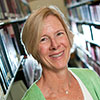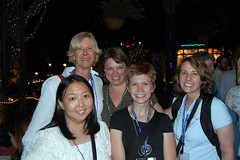This article is more than 5 years old.
Yesterday, I started out bright and early at the Alexander Street Press breakfast. Lauren had told me they typically have a dynamic speaker, and this year was no different. The subject focus was the Pentagon Papers, with a performance by actors from LA Theatre Works of a scene from Top Secret: The Battle for the Pentagon Papers. At the end of the scene, Daniel Ellsburg came up to deliver the main presentation and talked about his views on the state of the current government and their (Bush, Chaney, et al.) interpretation of the Constitution in regards to the crafters’ intentions on whether the new country would be a republic or a monarchy. He believes the current President believes in a “monarchy” with executive power to do whatever they deem necessary and appropriate. He didn’t mince words in delivering his opinion that they are “domestic enemies of the Constitution.” He was the most radical speaker I’ve listened to since my college Vietnam War days!
My second session of the day is a new “near and dear to my heart” topic: What’s the Future of Face-to-Face Reference? This program was presented by RUSA MARS (Machine Assisted Reference Service!). Speakers from three institutions talked about innovative approaches they are taking to extend their reference services beyond the traditional way. The speaker who most caught my attention was Sara Davidson from UC Merced. She explained that since they were a brand new campus (in 2005), they were able to start their services up exactly how they envisioned they should be. A new campus meant no listening to “this is how we’ve always done it.” They had no legacy systems to deal with. Their motto: “Not What Other Research Libraries Are But What They Will Be.” There is no physical reserve system and basically all journals are electronic. There is a One-Stop-Shop information desk that is staff almost excusively by student assistants as they believe that sitting behind a desk may no longer be the best way to provide quality service.
Their stated values are very futuristic compared to our realities:
- An environment in which in-person ref and instruction are exception rather than the rule. (They want a transparent environment resulting in less need for these).
- Persistent, asynchronous, multi-user forms of communication.
- Librarians as managers who work on broad solutions. (“just in time ref, not just in case”)
- Providing services that reflect their current information and technological environment and the diversity of their users.
The afternoon started at the ACRL-Instruction Section program where I was presented with the IS Innovation in Instruction award. This was the first of two presentation ceremonies, and it was a bit amusing that Tim Fusco, from Lexis-Nexis, handed me the certificate but then took it back so it could be presented again at the Lexis-Nexis breakfast this morning.
Lynn talked a bit about the speaker at this event, Jeff Liles. He did spend some time talking about learning theories: behaviorism, cognitive theory and constructivism. He introduced two “new” proposed theories (the jury is still out on whether these are theories or pedagogical approaches): Connectivism and brain-based learning. Connectivism was developed by George Siemens to explain the effect technology has had on how we live, how we communicate, and how we learn. Brain-based learning is an approach to instruction based on how current research in neuroscience suggests our brain learns naturally. Unfortunately, I don’t think any of the theories were working for me, as I had to sit in the front row and stay attentive for the entire two hours. I think it blew my brain out of whack 🙂
The final session of the day was the LITA President’s Program, Isn’t it Great to Be in the Library? (Wherever that is), where panelists addressed the issue of the physical vs. the virtual library.
Carolyn and I met up at day’s end and rode the shuttle to the Disneyland Hotel to attend the combined library school reunion reception. It turns out that Jim Carmichael is the only faculty member still at UNCG since I graduated in 1993. It was enjoyable to meet Lee Shiftlett, who is the current head of their program, and chat about what they are doing with their accreditation effort and what plans he has for developing continuing ed classes for practicing librarians.
From there, we headed to the ExLibris reception. Although I don’t know anyone there anymore, I do know they always throw a lavish party at ALA. They didn’t disappoint this time either. They took over an entire restaurant, Jazz Kitchen, and had tons of good food and free beverages. Now I know where some of our maintenance money goes. We met up with Elizabeth, Sarah and Lauren and had a fun evening on ExLibris!

